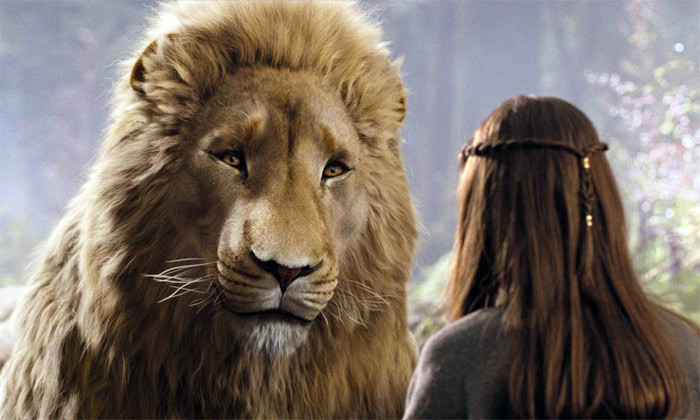From the Blitz to the Wardrobe. Andrew Adamson and the production team hit LWW out of the ballpark. But the film’s early scenes were uber-perfect, from the German bombers to the train station farewell to Lucy discovering the wardrobe, the snow and the iconic lamppost. Harry Gregson-Williams’ score was fantastic, especially “Evacuating London” and “The Wardrobe.” So much of what appeared on screen looked exactly like what millions of readers had always held in their imaginations. This was a great way to start the franchise.
Aslan. Many fans rightfully feared that Aslan would look cartoonish in the Narnia films. Indeed, the creation of a photorealistic lion would prove to be a daunting task for the production. With the exception of the roar at the end of the LWW teaser, and perhaps Lucy’s dream sequence in PC, I am happy to report that Adamson, Apted and countless visual effects artists did incredibly good work on Aslan. For my money, Aslan’s best scenes are his first appearance to the children in LWW and at the end of VDT. The visuals, script and music combine to give fans a memorable introduction (and farewell) to Narnia’s ruler. None of this is to overlook Aslan’s voice; Liam Neeson deserves credit for his outstanding vocal talent.
Tilda Swinton as the White Witch. Other than casting Georgie Henley as Lucy, I don’t know that a better casting call was made than to award Tilda Swinton the role of the White Witch. Swinton was pitch-perfect, playing the witch as appropriately seductive, tempting and evil.
Eustace. Readers know little of Eustace, except that Lewis says the boy (almost) deserved his name. Thus was born the character that Narnia fans love to hate, and Will Poulter’s portrayal in VDT was spot on. He was an annoying, melodramatic brat at the beginning of the story and completely changed at the end, just as Lewis intended. Eustace’s transformation in the film was more than believable. A great tragedy of the series’ moratorium is that we likely won’t see Poulter in character as Eustace ever again.
The Visuals. Lewis often said that he was motivated to write by looking at scenery that made him long for another world. The challenge of any Narnia film is to leave audiences with the same impression, and all three films succeed. The battle shots from LWW, random dryads, and countless seascapes from VDT – not to mention the island locales – made Narnia a very real place to millions of fans. Early on, Andrew Adamson said that Narnia was always a real place to him and he wanted it to be portrayed as such. He was entirely correct, and the films are better for it. But which film is best? I argue that VDT offers the most breathtaking scenery by default, given the structure of the story. The setting sun over the ocean, the sea of lilies and the standing wave in front of Aslan’s Country…I could go on and on.
And there you have it – part one of my post-mortem of the three Narnia films thus far. Sound off in the comments section and check back with NarniaFans soon for five low points from the film trilogy.

